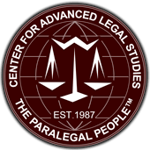
Thomas B. Swanson, J.D.
Academic Dean and Faculty
"Students realize that I'm committed to them entering the field and doing well..."
An Original Paralegal Instructor
Thomas Swanson is an original. He was the first teacher that the Center for Advanced Legal Studies hired 27 years ago and his crusty charm, self-effacing humor, and extensive knowledge of the law make him someone to impress and emulate for students and faculty alike.
An Original Paralegal
Born in Washington, D.C., Swanson served in the United States Air Force from 1971 to 1976 where he worked primarily as a paralegal. He received a Commendation Medal for his outstanding service as an investigator in the USAF Foreign Claims Commission in Taipei, Taiwan. After obtaining a Bachelor of Arts in Political Science from the University of Florida, he came to Houston, where he entered the South Texas College of Law, graduating with a Doctorate of Jurisprudence. He was licensed as Texas attorney by the Supreme Court of Texas in May of 1981. After having worked for a number of years at an established Houston law firm, Swanson started his own firm in 1986.















